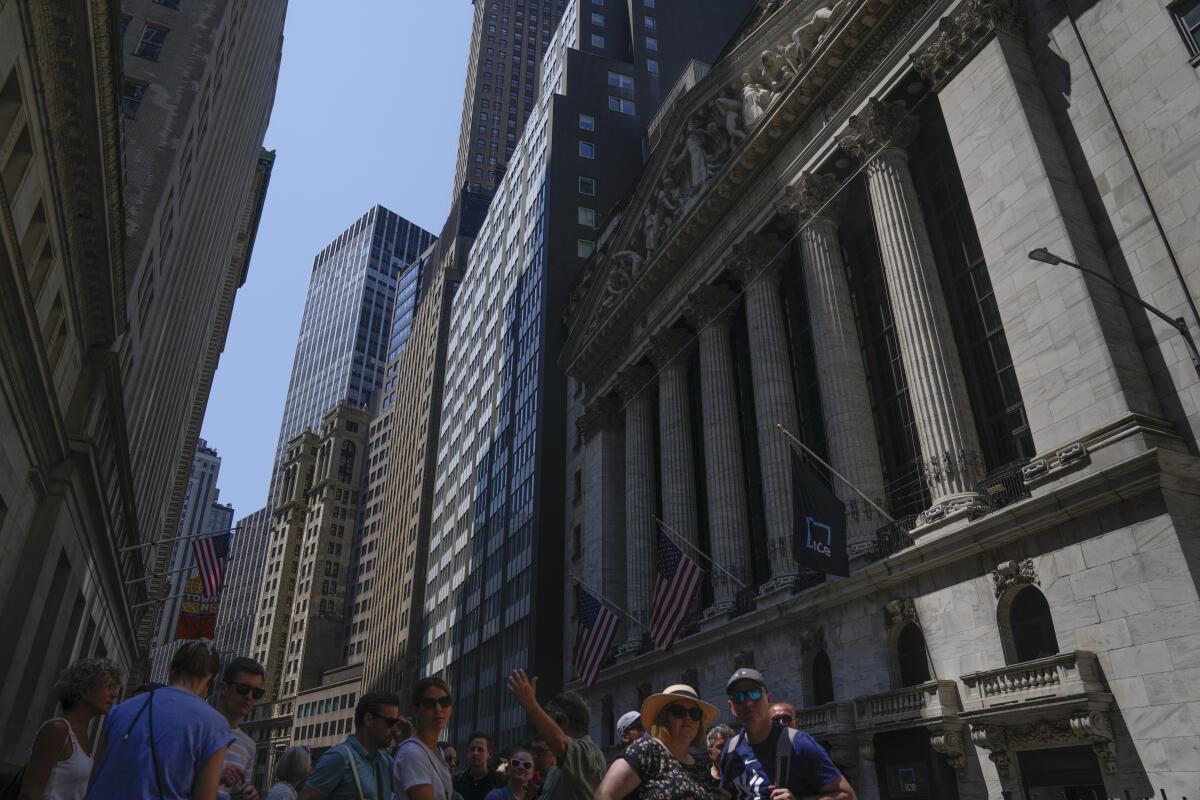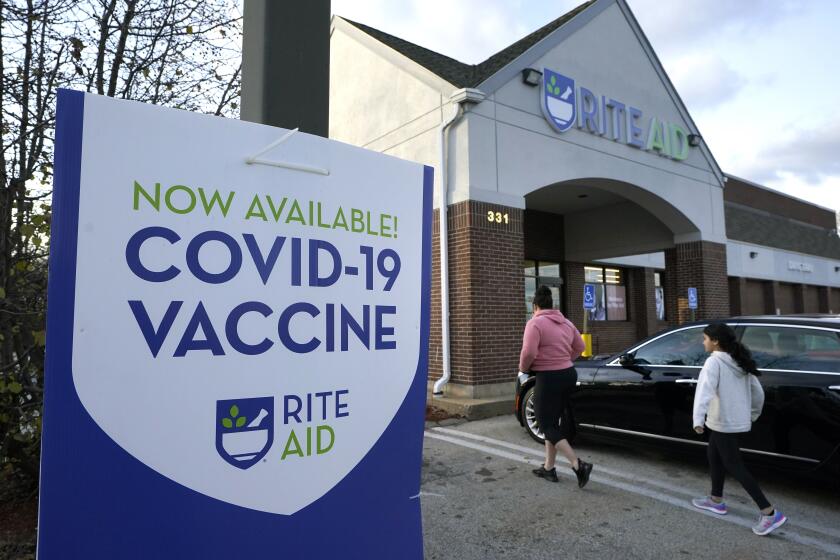Wall Street drops after profit reports, and oil prices jump on war worries

- Share via
Wall Street dropped Wednesday after rising Treasury yields tightened the vise further on the stock market and big U.S. companies delivered a mixed set of profit reports. Worries about war in the Middle East also dragged on the market.
The Standard & Poor’s 500 sank 1.3%. The Dow Jones industrial average dropped 1%, and the Nasdaq composite lost 1.6%.
Crude oil prices jumped sharply overnight after a deadly explosion at a hospital in the Gaza Strip, which sparked protests across the Middle East. But oil prices pared their gains as the morning progressed. Gold, meanwhile, kept rising as investors have looked for safer investments since the Oct. 7 surprise attack on Israel by Hamas.
On Wall Street, United Airlines slumped 9.7% after it showed how big a hit to profits it may take because of surging fuel prices and the suspension of flights to Tel Aviv. It gave a profit forecast for the last three months of the year that fell well short of analysts’ expectations.
The forecast overshadowed United’s reporting a bigger profit for the summer than Wall Street had forecast. Other airlines fell in concert, with American Airlines down 4.9% and Delta Air Lines down 4.4%.
X, formerly known as Twitter, said Tuesday it was introducing a pilot program to charge new accounts $1 a year to post in an effort to reduce spam bots.
Morgan Stanley also tumbled, down 6.8%, even though it likewise reported a bigger profit for the latest quarter than analysts expected. Investors focused on a weaker-than-expected showing by the company’s wealth management business, analysts said.
On the winning side of Wall Street was Procter & Gamble, the giant behind such brands as Charmin, Febreze and Oral-B. It rose 2.6% after reporting stronger-than-expected profit for the latest quarter. Its revenue rose after it increased prices for its products.
Nasdaq climbed 4% for one of the market’s bigger gains after reporting stronger profit than expected. It benefited from high-profile stock debuts on its trading exchange, as well as growth for its anti-financial crime business.
All told, the S&P 500 fell 58.60 points to 4,314.60. The Dow dropped 332.57 points to 33,665.08, and the Nasdaq sank 219.44 points to 13,314.30.
The earnings reporting season for the summer is still in its early days, and the broad expectation is for S&P 500 companies to say their overall earnings per share rose last quarter for the first time in a year.
Such growth in profits is essential for the stock market to keep rising, particularly when the other big factor that drives stock prices is pushing the other way.
Retail sales rose 0.7% in September, more than twice what economists had expected, as Americans kept spending online and at restaurants.
Treasury yields in the bond market have been on a steady march higher as investors accept a new normal in which the Federal Reserve is likely to keep interest rates high to get inflation under control. High rates and yields hurt prices for stocks and other investments.
The yield on the 10-year Treasury rose to 4.89% from 4.84% late Tuesday and from less than 3.50% during the spring. It topped 4.90% earlier in the day for the first time since since 2007.
Financial markets “are increasingly concerned that the next move higher could be on the cusp of 5%, and whether the broader economy is equipped to assimilate” the higher costs to raise money, said Quincy Krosby, chief global strategist for LPL Financial.
Yields have climbed as the U.S. economy has remained remarkably resilient, even after the Federal Reserve raised its main interest rate to the highest level since 2001. That strength has a large group of investors believing the Fed may pull off the balancing act of slowing the economy through high rates just enough to smother high inflation but not so much as to cause a painful recession.
Still, investors remain cautious. Global fund managers are holding more cash to protect themselves, up to 5.3% of their total portfolios in October from 4.9%, according to the latest survey by Bank of America.
A big threat for the global economy is what oil prices do to inflation amid the latest war between Hamas and Israel.
In the oil market, a barrel of U.S. crude climbed $1.66 to $88.32 a barrel. It approached $90 early in the morning before paring its gain. Brent crude, the international standard, rose $1.60 to $91.50 after earlier nearing $93 a barrel.
The spark for the jump was a blast at a Gaza hospital that reportedly killed hundreds. Hamas blamed it on an Israeli airstrike, while the Israeli military blamed a rocket misfired by members of another Palestinian militant group. President Biden seemed to suggest it wasn’t Israel.
The fear in financial markets is that the latest Hamas-Israel war will draw in big oil-producing nations, such as Iran, and lead to disruptions of supply.
Rite Aid’s plan to close more stores as part of its bankruptcy process raises concern about how that might hurt access to medicine and care.
Iranian Foreign Minister Hossein Amirabdollahian called on Muslim nations Wednesday to expel their Israeli ambassadors and launch an oil embargo on Israel after the explosion at the hospital.
Gold rose $32.60 to $1,968.30 an ounce as investors looked for things that looked safer to own.
In stock markets abroad, indexes slumped in much of Europe after ending mixed in Asia.
China reported Wednesday that its economy grew at a 4.9% annual pace from July through September. That’s down from 6.3% growth in the previous quarter but better than economists feared for the world’s second-largest economy.
AP writers Matt Ott, Elaine Kurtenbach and Zen Soo contributed to this report.
More to Read
Inside the business of entertainment
The Wide Shot brings you news, analysis and insights on everything from streaming wars to production — and what it all means for the future.
You may occasionally receive promotional content from the Los Angeles Times.













